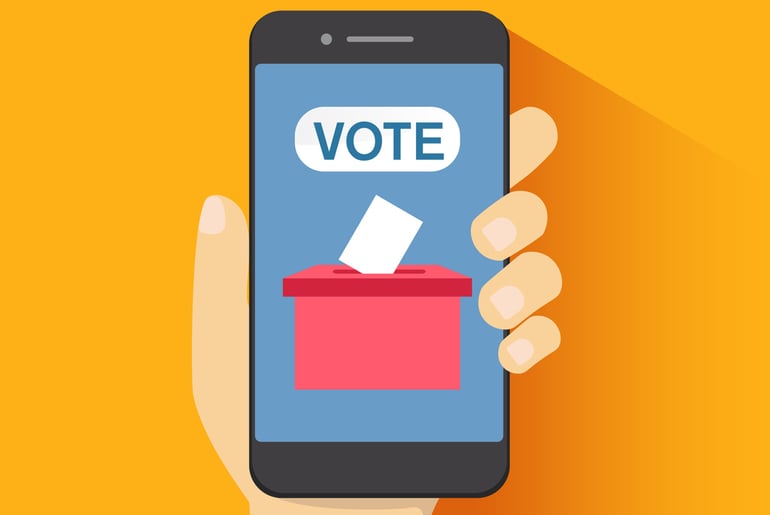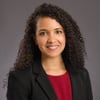 In a recent interview, I had the opportunity to speak with Prince Taylor, alumnus of the Facing History School in New York City and team member at Politicking—a mobile app that offers comprehensive, nonpartisan information designed to empower millennial voters to cast their ballots. In this interview, we discuss his work at Politicking, their work to counter voter suppression and/or barriers to voting, and how Facing History shaped Taylor’s professional trajectory. Formed in collaboration with Facing History and Ourselves in 2005, The Facing History School is a public high school deeply informed by Facing History pedagogy within the New York City Public Schools system.
In a recent interview, I had the opportunity to speak with Prince Taylor, alumnus of the Facing History School in New York City and team member at Politicking—a mobile app that offers comprehensive, nonpartisan information designed to empower millennial voters to cast their ballots. In this interview, we discuss his work at Politicking, their work to counter voter suppression and/or barriers to voting, and how Facing History shaped Taylor’s professional trajectory. Formed in collaboration with Facing History and Ourselves in 2005, The Facing History School is a public high school deeply informed by Facing History pedagogy within the New York City Public Schools system.
KS: Can you tell me a bit about your organization and the mission that drives your work?
PT: I work for a company called Politicking, or The Politicking App. We are a nonpartisan, comprehensive political information and advertising app. You put your address into the app and it'll give you a list of every elected official in your area from the president down to the county clerk. When I voted in 2016, I didn't know who I was voting for besides who was running for president. Politicking solves that problem by giving you that information about the county clerk, your district attorney, your sheriff, and every other official in your district. All are equally important. We are looking to grow as a company and be able to cover every district in the country. We’re not yet in every area because we're a data-driven company but we’ll get there.
I love Politicking because it's strictly about information. In my role, I have learned just how important local government and politics are despite the focus on the national politics you see on TV every day… the president, the Senate, and the House of Representatives.
We try to interview the big politicians and local elected officials, as well. They interviewed this lady who was elected in a town in South Carolina where they had only 890 people in the town. She had lost her first election by only 12 votes… Our co-founders have also interviewed Bakari Sellers, they've interviewed Congresswoman Rashida Tlaib, Congressman Andre Carson, and Mayor Pete Buttigieg.
KS: In what ways is the team behind the Politicking app striving to disrupt voter suppression and/or barriers to voting?
PT: Well first, this app is geared toward millennials. In 2018, only 31% of 80 million millennials voted which is insane. For the next election, millennials are going to be the number one voting block in the country so that's obviously key. So our main goal is to get millennials to vote. So again, download the app and share the app with others. It's that easy. You can put your information in, and you're now so much more informed than the average voter.
Speaking just about African Americans, this app is our ancestors' wildest dreams in a sense. The main way to keep us from progressing has been keeping information about politics from us, and it's gotten to the point now where black people are discouraged from voting. Some of us don't like voting because we think the government isn't working for us. On top of that, we know that there are forces or people actively suppressing the vote. So, for example, in Florida, they've been fighting this bill for over a year now that requires felons to pay restitution before they can vote. These people who are trying to reenter society have no money and are trying to get a job now have to try to pay back money that they don't have in order to vote. What ultimately happens is they're just not able to vote.
Despite all of this, the Politicking app is a powerful tool for empowering as many people to exercise their right to vote as possible. Like I said, when I went to vote in 2016, it's sad that I didn't know who I was checking off. That's not what we're supposed to do as Americans so we are fighting it simply by just giving you information.
KS: How did your classroom experiences with Facing History shape your thinking and trajectory as a social impact professional?
PT: I watch way more FOX than I watch CNN, even though I would identify as closer to Democrat because I like to get the other side. I actually learned this when I attended the Facing History School in high school. I learned that it’s more important to listen to the other side and hear what the other side has to say than to listen to what you have to say, or what your friends think because you all think alike. It gives me an opportunity to hear the other side, see what they're thinking, and really just engage because how we're going to succeed in bringing the country together is by engaging with the other side. The key is just listening and reaching out to other people, and providing information to these people, too. That's really the key of Politicking.
I give a lot of credit to Facing History and I try to stay in contact with my teachers because it was just a great experience. One of the key lessons besides learning to listen to the other side is realizing how important your environment is, how your environment shapes you. Everyone uses the quote “you become the five people you are around” or something, but if you expand your circle of friends, it will expand your thinking and it will give you different experiences which will then change you as a person.
The other one was being an upstander, not a bystander. The famous example is if there are 100 people standing around and someone's drowning, more people are likely to stand around and watch, thinking that someone else is going to help the person drowning, and the person ends up drowning. That is being a bystander. The whole model of Facing History is being an upstander, not a bystander. Since I've graduated from Syracuse, I've had a bunch of different jobs, mainly in sales and I really haven't been excited about the work that I've been doing. But now that I'm working with Politicking, I feel amazing. For one, I don't feel like I'm working. That's cliche, too, but I feel like I'm just doing what I love. And I feel that in working for an organization that strives to inform everyday Americans, this is me being an upstander, not a bystander...and I feel like it's all because of Facing History.
--
Facing History and Ourselves invites educators to access our collection of Teaching Resources for the 2020 U.S. Election which are designed to help students think critically about the role of elections, voting, and civic participation in creating and sustaining a just and healthy democracy.


